Ethical and Legal Dilemmas in Health and Human Service Management
VerifiedAdded on 2023/05/29
|7
|1460
|374
Essay
AI Summary
This essay discusses the ethical dilemmas and challenges faced by managers in health and human service management (HHSM). It highlights the importance of considering factors such as experience, background, professional standards, and available resources when making critical decisions. The essay also addresses the ethical considerations related to resource limitations, cost-effectiveness, quality of care, and the balance between patient rights and employee well-being. A specific example involving confidentiality and mandatory reporting laws is examined, emphasizing the conflict between ethical principles and legal requirements. The role of a manager in navigating these dilemmas, considering the potential impact on vulnerable individuals, and seeking alternative solutions is explored. Ultimately, the essay underscores the necessity of ethical principles, legal compliance, and critical thinking in effective healthcare management. Desklib offers a platform to explore more solved assignments and study resources for students.
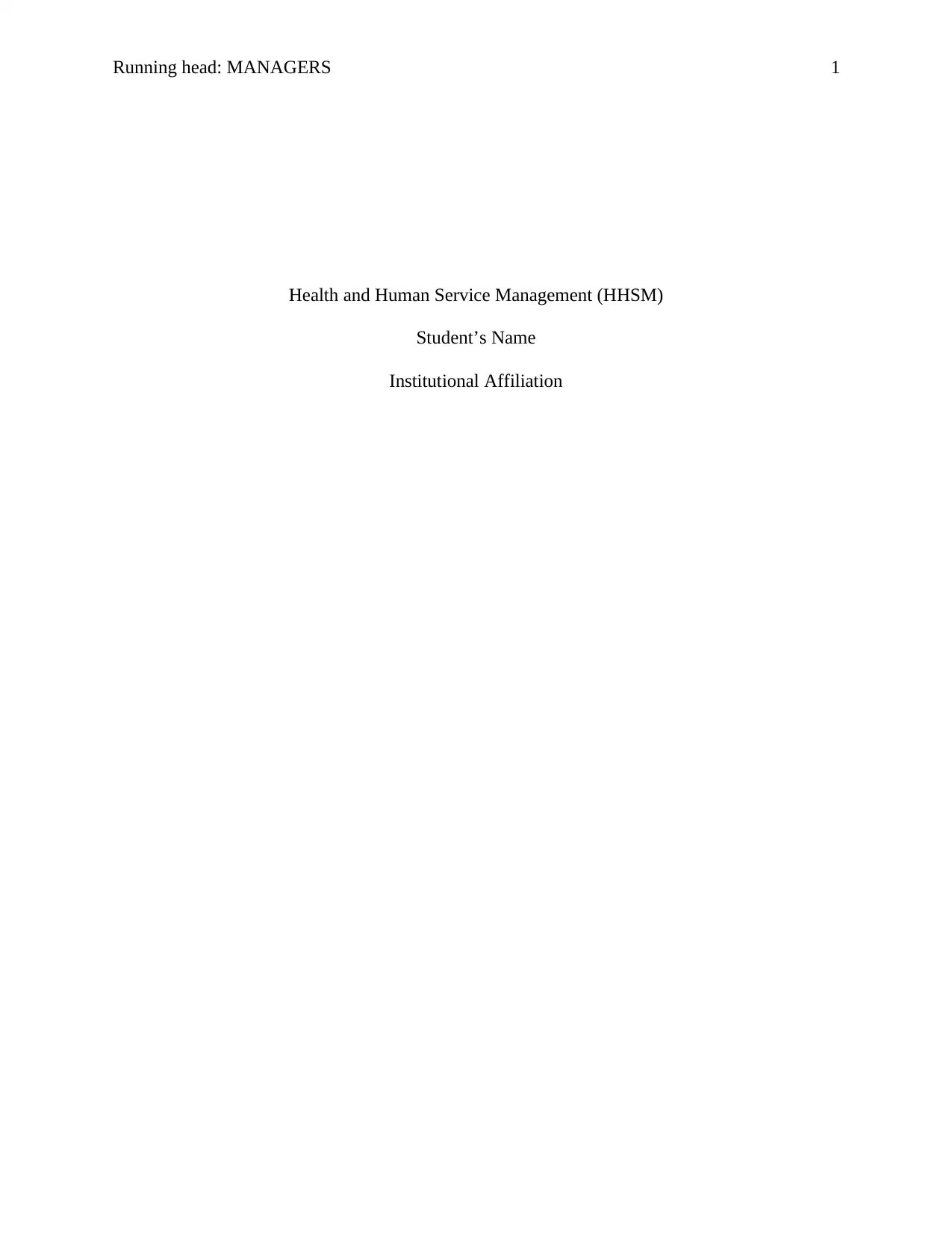
Running head: MANAGERS 1
Health and Human Service Management (HHSM)
Student’s Name
Institutional Affiliation
Health and Human Service Management (HHSM)
Student’s Name
Institutional Affiliation
Paraphrase This Document
Need a fresh take? Get an instant paraphrase of this document with our AI Paraphraser
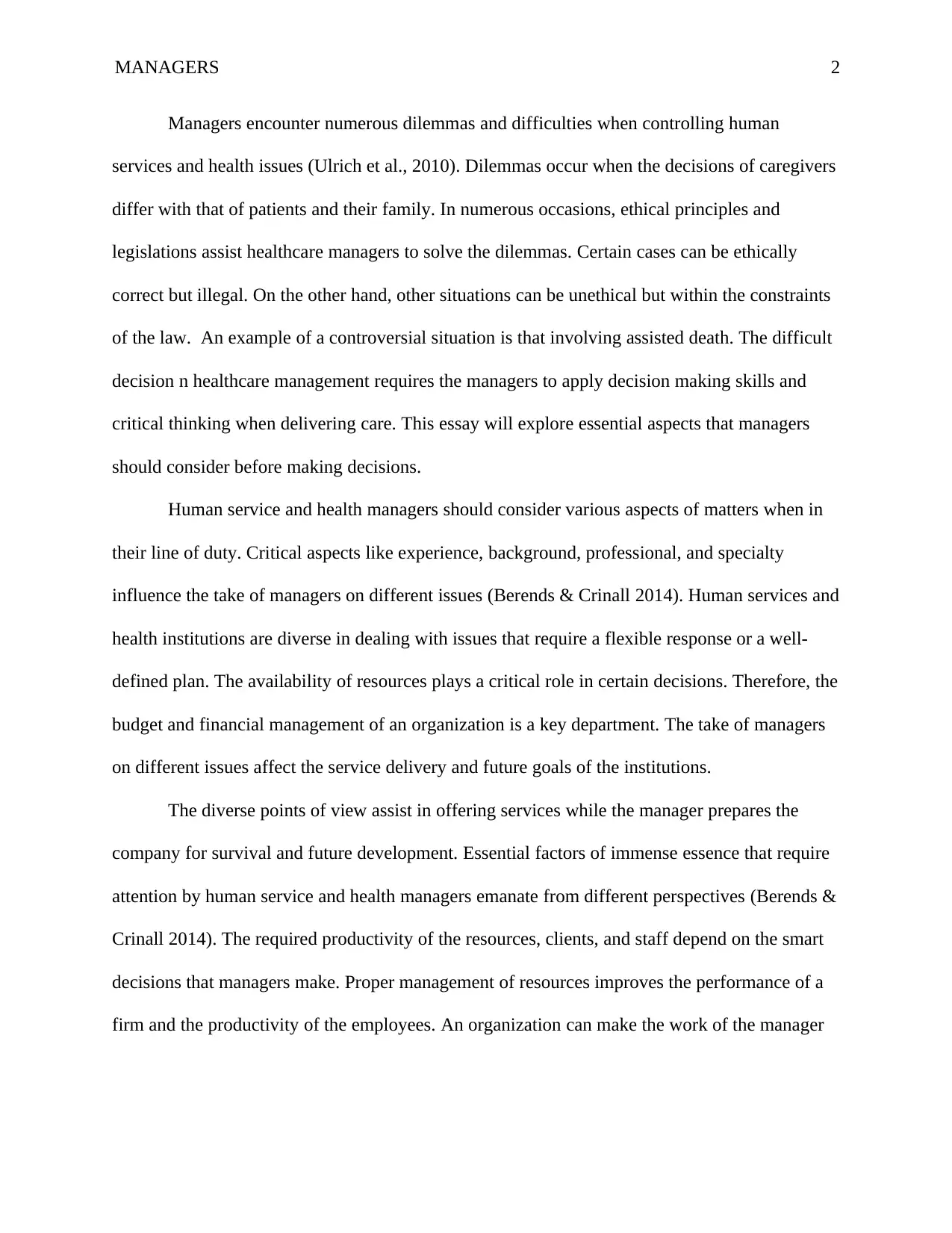
MANAGERS 2
Managers encounter numerous dilemmas and difficulties when controlling human
services and health issues (Ulrich et al., 2010). Dilemmas occur when the decisions of caregivers
differ with that of patients and their family. In numerous occasions, ethical principles and
legislations assist healthcare managers to solve the dilemmas. Certain cases can be ethically
correct but illegal. On the other hand, other situations can be unethical but within the constraints
of the law. An example of a controversial situation is that involving assisted death. The difficult
decision n healthcare management requires the managers to apply decision making skills and
critical thinking when delivering care. This essay will explore essential aspects that managers
should consider before making decisions.
Human service and health managers should consider various aspects of matters when in
their line of duty. Critical aspects like experience, background, professional, and specialty
influence the take of managers on different issues (Berends & Crinall 2014). Human services and
health institutions are diverse in dealing with issues that require a flexible response or a well-
defined plan. The availability of resources plays a critical role in certain decisions. Therefore, the
budget and financial management of an organization is a key department. The take of managers
on different issues affect the service delivery and future goals of the institutions.
The diverse points of view assist in offering services while the manager prepares the
company for survival and future development. Essential factors of immense essence that require
attention by human service and health managers emanate from different perspectives (Berends &
Crinall 2014). The required productivity of the resources, clients, and staff depend on the smart
decisions that managers make. Proper management of resources improves the performance of a
firm and the productivity of the employees. An organization can make the work of the manager
Managers encounter numerous dilemmas and difficulties when controlling human
services and health issues (Ulrich et al., 2010). Dilemmas occur when the decisions of caregivers
differ with that of patients and their family. In numerous occasions, ethical principles and
legislations assist healthcare managers to solve the dilemmas. Certain cases can be ethically
correct but illegal. On the other hand, other situations can be unethical but within the constraints
of the law. An example of a controversial situation is that involving assisted death. The difficult
decision n healthcare management requires the managers to apply decision making skills and
critical thinking when delivering care. This essay will explore essential aspects that managers
should consider before making decisions.
Human service and health managers should consider various aspects of matters when in
their line of duty. Critical aspects like experience, background, professional, and specialty
influence the take of managers on different issues (Berends & Crinall 2014). Human services and
health institutions are diverse in dealing with issues that require a flexible response or a well-
defined plan. The availability of resources plays a critical role in certain decisions. Therefore, the
budget and financial management of an organization is a key department. The take of managers
on different issues affect the service delivery and future goals of the institutions.
The diverse points of view assist in offering services while the manager prepares the
company for survival and future development. Essential factors of immense essence that require
attention by human service and health managers emanate from different perspectives (Berends &
Crinall 2014). The required productivity of the resources, clients, and staff depend on the smart
decisions that managers make. Proper management of resources improves the performance of a
firm and the productivity of the employees. An organization can make the work of the manager
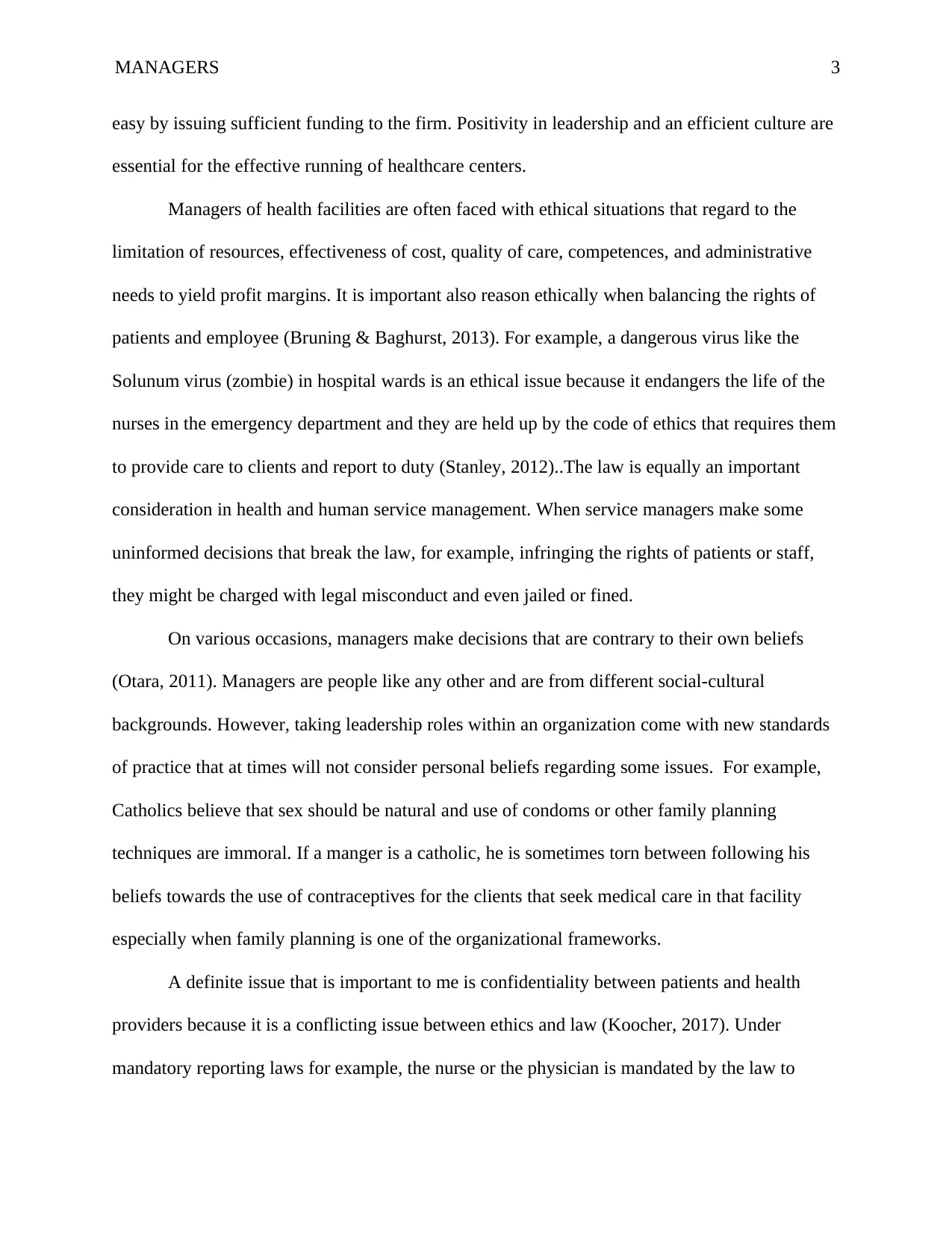
MANAGERS 3
easy by issuing sufficient funding to the firm. Positivity in leadership and an efficient culture are
essential for the effective running of healthcare centers.
Managers of health facilities are often faced with ethical situations that regard to the
limitation of resources, effectiveness of cost, quality of care, competences, and administrative
needs to yield profit margins. It is important also reason ethically when balancing the rights of
patients and employee (Bruning & Baghurst, 2013). For example, a dangerous virus like the
Solunum virus (zombie) in hospital wards is an ethical issue because it endangers the life of the
nurses in the emergency department and they are held up by the code of ethics that requires them
to provide care to clients and report to duty (Stanley, 2012)..The law is equally an important
consideration in health and human service management. When service managers make some
uninformed decisions that break the law, for example, infringing the rights of patients or staff,
they might be charged with legal misconduct and even jailed or fined.
On various occasions, managers make decisions that are contrary to their own beliefs
(Otara, 2011). Managers are people like any other and are from different social-cultural
backgrounds. However, taking leadership roles within an organization come with new standards
of practice that at times will not consider personal beliefs regarding some issues. For example,
Catholics believe that sex should be natural and use of condoms or other family planning
techniques are immoral. If a manger is a catholic, he is sometimes torn between following his
beliefs towards the use of contraceptives for the clients that seek medical care in that facility
especially when family planning is one of the organizational frameworks.
A definite issue that is important to me is confidentiality between patients and health
providers because it is a conflicting issue between ethics and law (Koocher, 2017). Under
mandatory reporting laws for example, the nurse or the physician is mandated by the law to
easy by issuing sufficient funding to the firm. Positivity in leadership and an efficient culture are
essential for the effective running of healthcare centers.
Managers of health facilities are often faced with ethical situations that regard to the
limitation of resources, effectiveness of cost, quality of care, competences, and administrative
needs to yield profit margins. It is important also reason ethically when balancing the rights of
patients and employee (Bruning & Baghurst, 2013). For example, a dangerous virus like the
Solunum virus (zombie) in hospital wards is an ethical issue because it endangers the life of the
nurses in the emergency department and they are held up by the code of ethics that requires them
to provide care to clients and report to duty (Stanley, 2012)..The law is equally an important
consideration in health and human service management. When service managers make some
uninformed decisions that break the law, for example, infringing the rights of patients or staff,
they might be charged with legal misconduct and even jailed or fined.
On various occasions, managers make decisions that are contrary to their own beliefs
(Otara, 2011). Managers are people like any other and are from different social-cultural
backgrounds. However, taking leadership roles within an organization come with new standards
of practice that at times will not consider personal beliefs regarding some issues. For example,
Catholics believe that sex should be natural and use of condoms or other family planning
techniques are immoral. If a manger is a catholic, he is sometimes torn between following his
beliefs towards the use of contraceptives for the clients that seek medical care in that facility
especially when family planning is one of the organizational frameworks.
A definite issue that is important to me is confidentiality between patients and health
providers because it is a conflicting issue between ethics and law (Koocher, 2017). Under
mandatory reporting laws for example, the nurse or the physician is mandated by the law to
⊘ This is a preview!⊘
Do you want full access?
Subscribe today to unlock all pages.

Trusted by 1+ million students worldwide
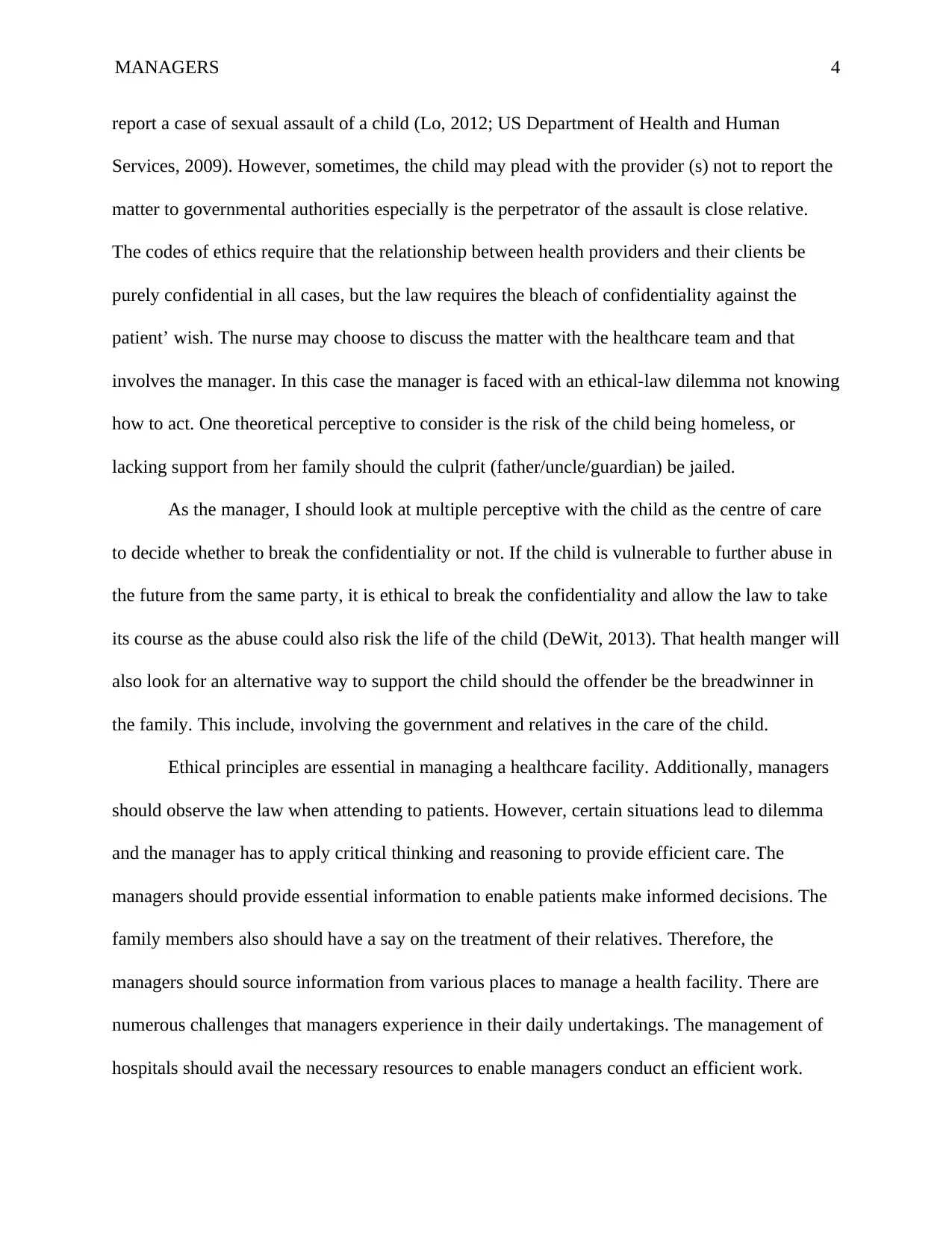
MANAGERS 4
report a case of sexual assault of a child (Lo, 2012; US Department of Health and Human
Services, 2009). However, sometimes, the child may plead with the provider (s) not to report the
matter to governmental authorities especially is the perpetrator of the assault is close relative.
The codes of ethics require that the relationship between health providers and their clients be
purely confidential in all cases, but the law requires the bleach of confidentiality against the
patient’ wish. The nurse may choose to discuss the matter with the healthcare team and that
involves the manager. In this case the manager is faced with an ethical-law dilemma not knowing
how to act. One theoretical perceptive to consider is the risk of the child being homeless, or
lacking support from her family should the culprit (father/uncle/guardian) be jailed.
As the manager, I should look at multiple perceptive with the child as the centre of care
to decide whether to break the confidentiality or not. If the child is vulnerable to further abuse in
the future from the same party, it is ethical to break the confidentiality and allow the law to take
its course as the abuse could also risk the life of the child (DeWit, 2013). That health manger will
also look for an alternative way to support the child should the offender be the breadwinner in
the family. This include, involving the government and relatives in the care of the child.
Ethical principles are essential in managing a healthcare facility. Additionally, managers
should observe the law when attending to patients. However, certain situations lead to dilemma
and the manager has to apply critical thinking and reasoning to provide efficient care. The
managers should provide essential information to enable patients make informed decisions. The
family members also should have a say on the treatment of their relatives. Therefore, the
managers should source information from various places to manage a health facility. There are
numerous challenges that managers experience in their daily undertakings. The management of
hospitals should avail the necessary resources to enable managers conduct an efficient work.
report a case of sexual assault of a child (Lo, 2012; US Department of Health and Human
Services, 2009). However, sometimes, the child may plead with the provider (s) not to report the
matter to governmental authorities especially is the perpetrator of the assault is close relative.
The codes of ethics require that the relationship between health providers and their clients be
purely confidential in all cases, but the law requires the bleach of confidentiality against the
patient’ wish. The nurse may choose to discuss the matter with the healthcare team and that
involves the manager. In this case the manager is faced with an ethical-law dilemma not knowing
how to act. One theoretical perceptive to consider is the risk of the child being homeless, or
lacking support from her family should the culprit (father/uncle/guardian) be jailed.
As the manager, I should look at multiple perceptive with the child as the centre of care
to decide whether to break the confidentiality or not. If the child is vulnerable to further abuse in
the future from the same party, it is ethical to break the confidentiality and allow the law to take
its course as the abuse could also risk the life of the child (DeWit, 2013). That health manger will
also look for an alternative way to support the child should the offender be the breadwinner in
the family. This include, involving the government and relatives in the care of the child.
Ethical principles are essential in managing a healthcare facility. Additionally, managers
should observe the law when attending to patients. However, certain situations lead to dilemma
and the manager has to apply critical thinking and reasoning to provide efficient care. The
managers should provide essential information to enable patients make informed decisions. The
family members also should have a say on the treatment of their relatives. Therefore, the
managers should source information from various places to manage a health facility. There are
numerous challenges that managers experience in their daily undertakings. The management of
hospitals should avail the necessary resources to enable managers conduct an efficient work.
Paraphrase This Document
Need a fresh take? Get an instant paraphrase of this document with our AI Paraphraser
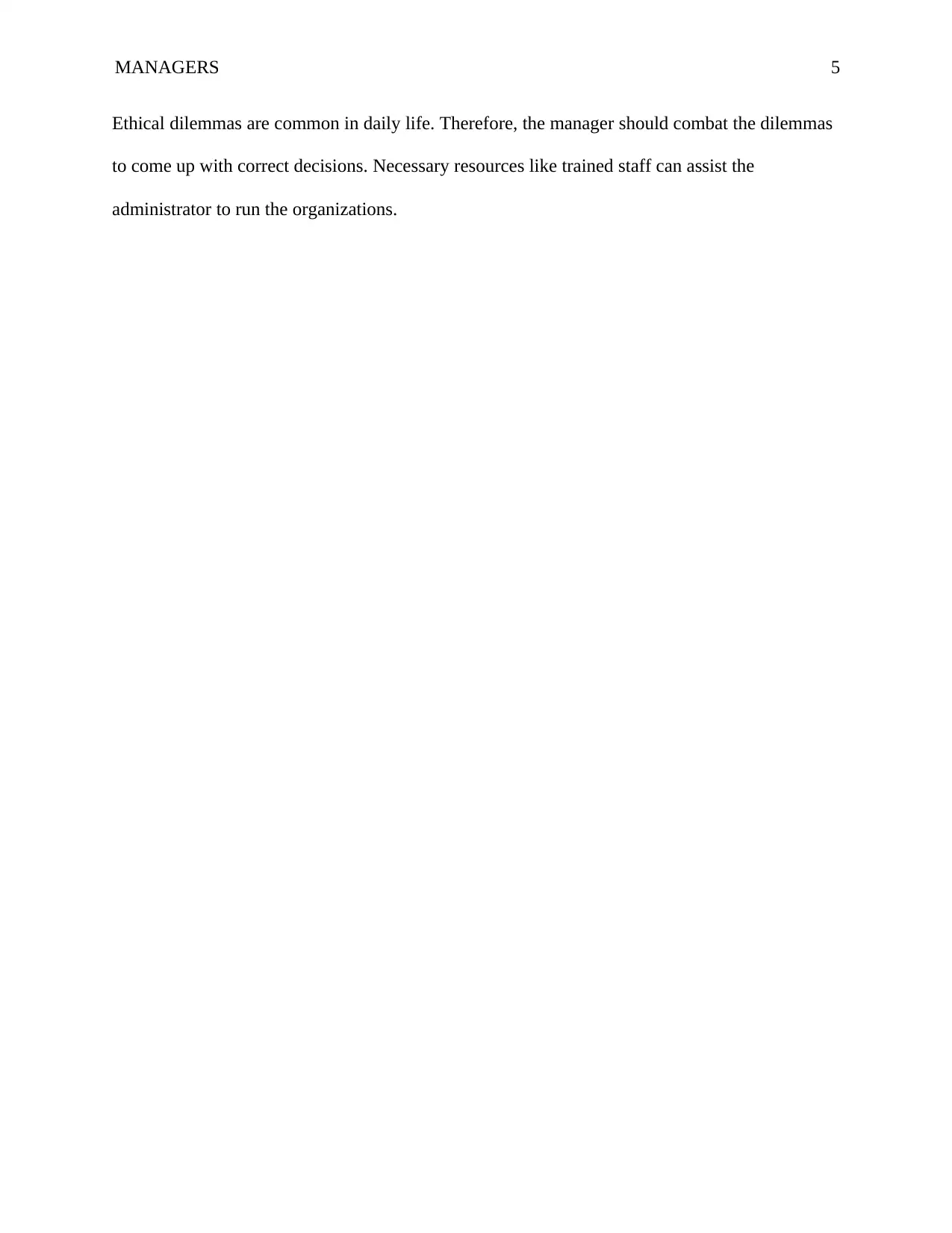
MANAGERS 5
Ethical dilemmas are common in daily life. Therefore, the manager should combat the dilemmas
to come up with correct decisions. Necessary resources like trained staff can assist the
administrator to run the organizations.
Ethical dilemmas are common in daily life. Therefore, the manager should combat the dilemmas
to come up with correct decisions. Necessary resources like trained staff can assist the
administrator to run the organizations.
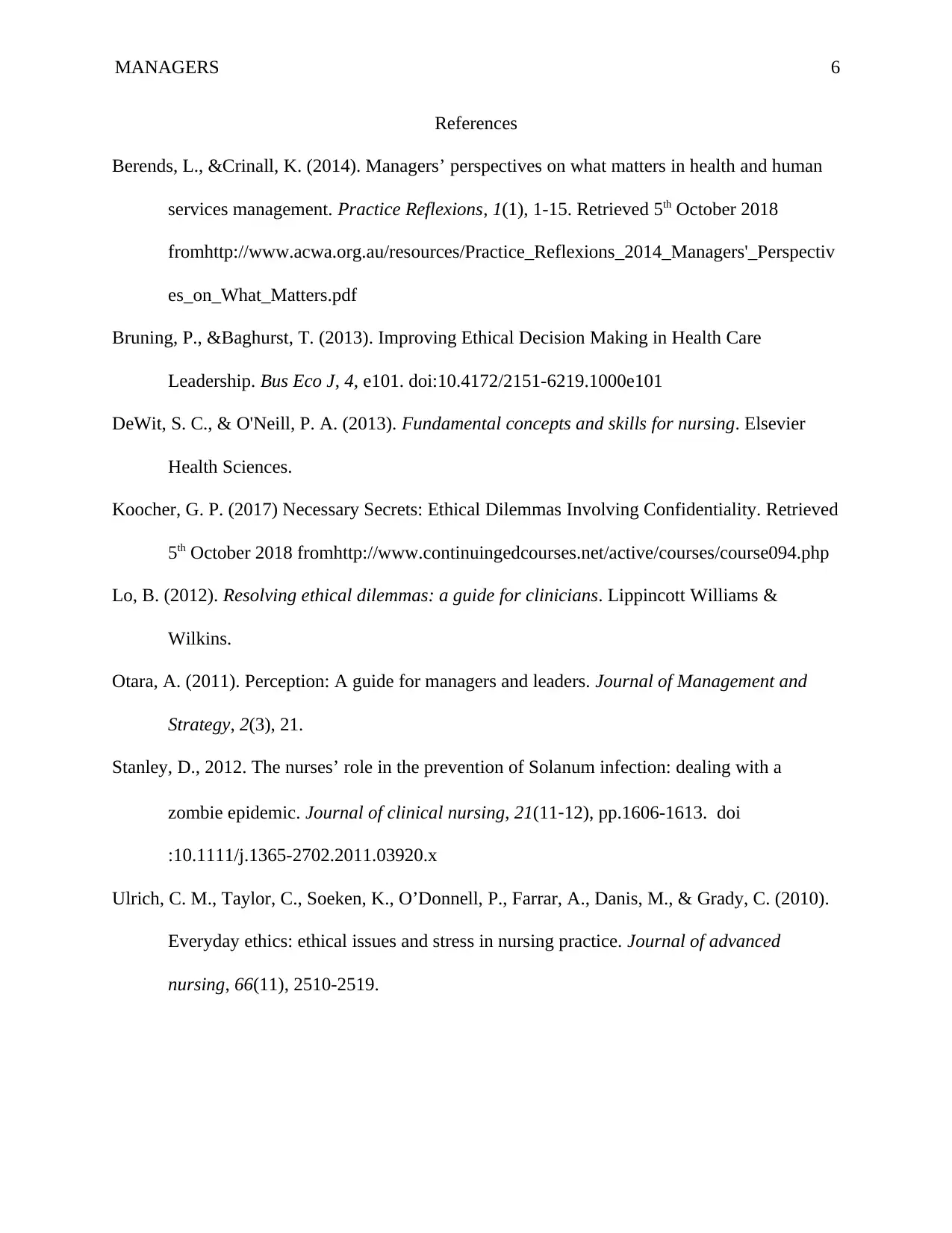
MANAGERS 6
References
Berends, L., &Crinall, K. (2014). Managers’ perspectives on what matters in health and human
services management. Practice Reflexions, 1(1), 1-15. Retrieved 5th October 2018
fromhttp://www.acwa.org.au/resources/Practice_Reflexions_2014_Managers'_Perspectiv
es_on_What_Matters.pdf
Bruning, P., &Baghurst, T. (2013). Improving Ethical Decision Making in Health Care
Leadership. Bus Eco J, 4, e101. doi:10.4172/2151-6219.1000e101
DeWit, S. C., & O'Neill, P. A. (2013). Fundamental concepts and skills for nursing. Elsevier
Health Sciences.
Koocher, G. P. (2017) Necessary Secrets: Ethical Dilemmas Involving Confidentiality. Retrieved
5th October 2018 fromhttp://www.continuingedcourses.net/active/courses/course094.php
Lo, B. (2012). Resolving ethical dilemmas: a guide for clinicians. Lippincott Williams &
Wilkins.
Otara, A. (2011). Perception: A guide for managers and leaders. Journal of Management and
Strategy, 2(3), 21.
Stanley, D., 2012. The nurses’ role in the prevention of Solanum infection: dealing with a
zombie epidemic. Journal of clinical nursing, 21(11‐12), pp.1606-1613. doi
:10.1111/j.1365-2702.2011.03920.x
Ulrich, C. M., Taylor, C., Soeken, K., O’Donnell, P., Farrar, A., Danis, M., & Grady, C. (2010).
Everyday ethics: ethical issues and stress in nursing practice. Journal of advanced
nursing, 66(11), 2510-2519.
References
Berends, L., &Crinall, K. (2014). Managers’ perspectives on what matters in health and human
services management. Practice Reflexions, 1(1), 1-15. Retrieved 5th October 2018
fromhttp://www.acwa.org.au/resources/Practice_Reflexions_2014_Managers'_Perspectiv
es_on_What_Matters.pdf
Bruning, P., &Baghurst, T. (2013). Improving Ethical Decision Making in Health Care
Leadership. Bus Eco J, 4, e101. doi:10.4172/2151-6219.1000e101
DeWit, S. C., & O'Neill, P. A. (2013). Fundamental concepts and skills for nursing. Elsevier
Health Sciences.
Koocher, G. P. (2017) Necessary Secrets: Ethical Dilemmas Involving Confidentiality. Retrieved
5th October 2018 fromhttp://www.continuingedcourses.net/active/courses/course094.php
Lo, B. (2012). Resolving ethical dilemmas: a guide for clinicians. Lippincott Williams &
Wilkins.
Otara, A. (2011). Perception: A guide for managers and leaders. Journal of Management and
Strategy, 2(3), 21.
Stanley, D., 2012. The nurses’ role in the prevention of Solanum infection: dealing with a
zombie epidemic. Journal of clinical nursing, 21(11‐12), pp.1606-1613. doi
:10.1111/j.1365-2702.2011.03920.x
Ulrich, C. M., Taylor, C., Soeken, K., O’Donnell, P., Farrar, A., Danis, M., & Grady, C. (2010).
Everyday ethics: ethical issues and stress in nursing practice. Journal of advanced
nursing, 66(11), 2510-2519.
⊘ This is a preview!⊘
Do you want full access?
Subscribe today to unlock all pages.

Trusted by 1+ million students worldwide
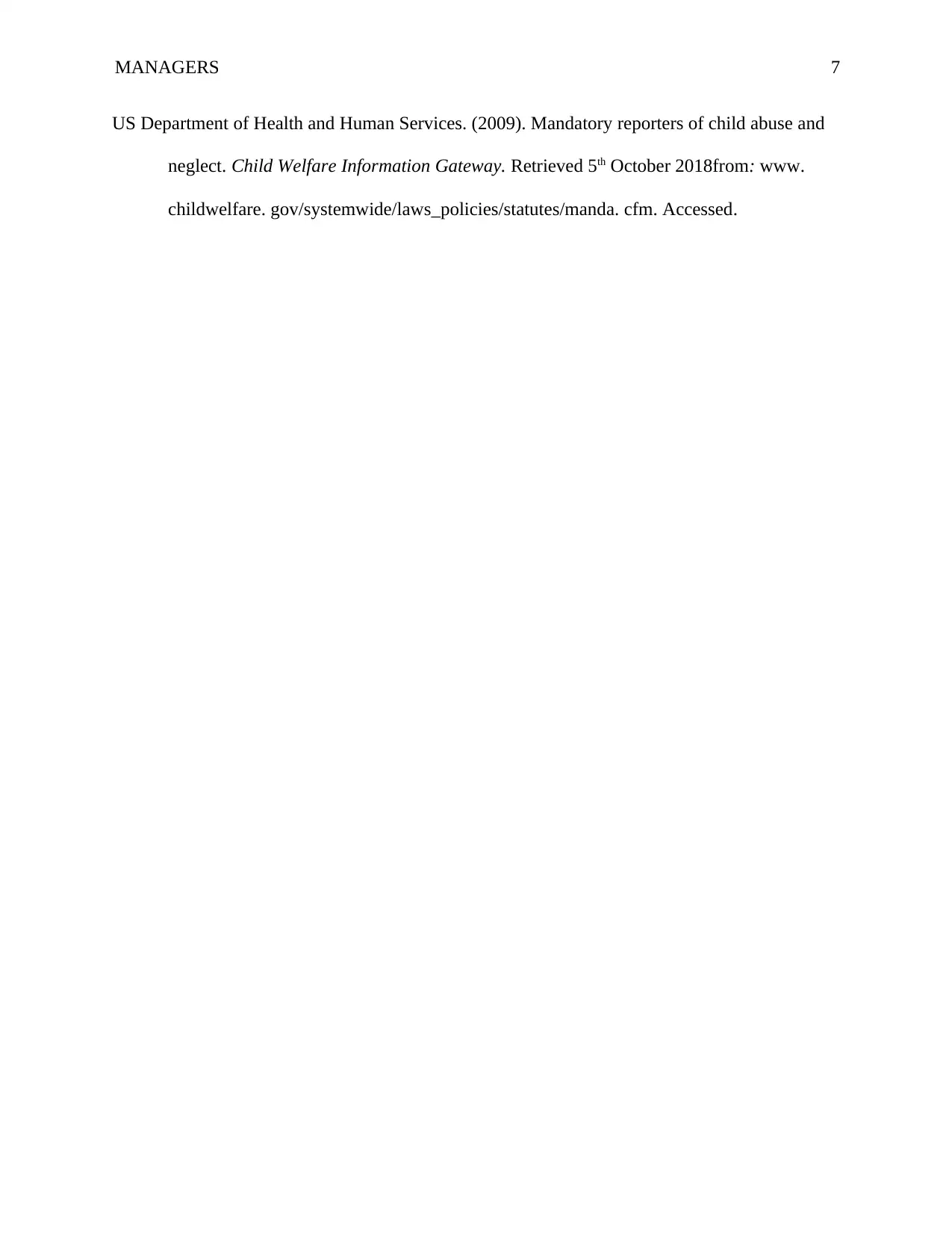
MANAGERS 7
US Department of Health and Human Services. (2009). Mandatory reporters of child abuse and
neglect. Child Welfare Information Gateway. Retrieved 5th October 2018from: www.
childwelfare. gov/systemwide/laws_policies/statutes/manda. cfm. Accessed.
US Department of Health and Human Services. (2009). Mandatory reporters of child abuse and
neglect. Child Welfare Information Gateway. Retrieved 5th October 2018from: www.
childwelfare. gov/systemwide/laws_policies/statutes/manda. cfm. Accessed.
1 out of 7
Related Documents
Your All-in-One AI-Powered Toolkit for Academic Success.
+13062052269
info@desklib.com
Available 24*7 on WhatsApp / Email
![[object Object]](/_next/static/media/star-bottom.7253800d.svg)
Unlock your academic potential
Copyright © 2020–2025 A2Z Services. All Rights Reserved. Developed and managed by ZUCOL.



